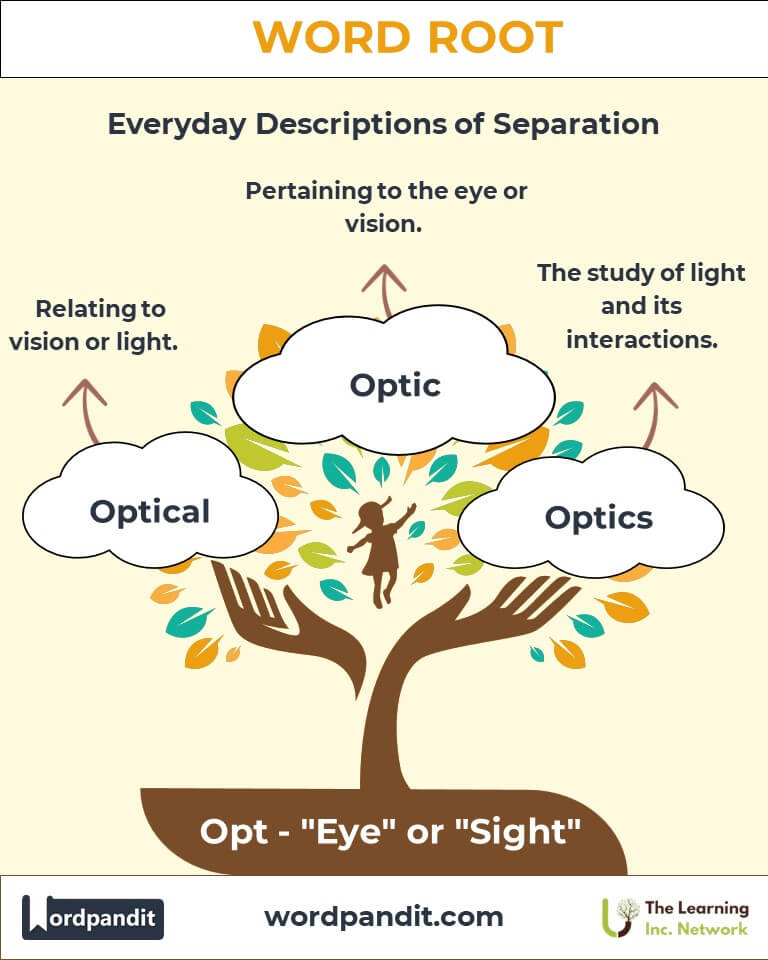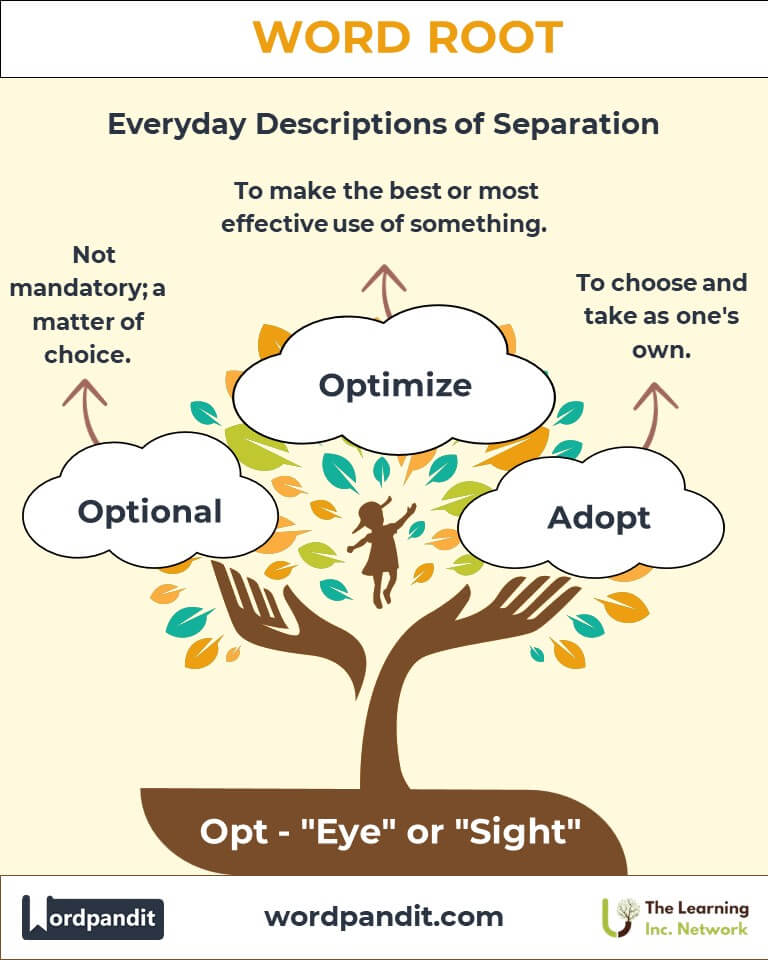Opt: The Root of Vision and Clarity in Language and Science
Byline:
Discover the profound influence of the word root "opt," originating from the Latin word optos, meaning "eye" or "sight." From everyday terms like "optical" to specialized fields such as "optometry," this root is integral to understanding vision, decision-making, and perception.

Table of Contents
- Introduction: The Essence of "Opt"
- Etymology and Historical Journey
- Mnemonic: Unlocking the Power of "Opt"
- Common "Opt"-Related Terms
- "Opt" Through Time
- "Opt" in Specialized Fields
- Illustrative Story: "Opt" in Action
- Cultural Significance of the "Opt" Root
- The "Opt" Family Tree
- FAQs about the "Opt" Word Root
- Test Your Knowledge: "Opt" Mastery Quiz
- Conclusion: The Living Legacy of "Opt"
Introduction: The Essence of "Opt"
Have you ever wondered about the connections between choosing the best option and the science of vision? The root "opt," pronounced as /opt/, encapsulates both clarity of sight and clarity of choice. Derived from the Latin word optos, meaning "seen" or "visible," this root has shaped numerous terms across disciplines. Whether it’s about optics—the science of light—or optometry, this root’s relevance is both practical and poetic.

Etymology and Historical Journey
The root "opt" traces back to the Greek optos (seen) and Latin optare (to choose or wish). Initially associated with vision, it evolved to encompass broader concepts of selection and clarity. During the Renaissance, as optical sciences advanced, "opt" entered the lexicon of modern languages, weaving itself into terms describing vision, light, and choice.
Mnemonic: Unlocking the Power of "Opt"
Picture a pair of gleaming eyeglasses labeled "OPT," offering crystal-clear views of the world. Beside them, envision a row of doors marked with choices, symbolizing decisions.
Mnemonic: "Opt clears your vision and helps you choose with precision."
Common "Opt"-Related Terms
- Optical
Definition: Relating to vision or light.
Example: "The optical illusion made the flat painting appear three-dimensional." - Optometrist
Definition: A healthcare professional specializing in eye care.
Example: "The optometrist recommended glasses to improve my eyesight." - Optional
Definition: Not mandatory; a matter of choice.
Example: "Participation in the workshop is optional but encouraged." - Optimize
Definition: To make the best or most effective use of something.
Example: "The app is designed to optimize battery life." - Adopt
Definition: To choose and take as one's own.
Example: "They decided to adopt eco-friendly practices in their daily lives." - Optic
Definition: Relating to the eye or vision.
Example: "The optic nerve transmits signals from the retina to the brain."
"Opt" Through Time
- Optics: The branch of physics dealing with light dates back to ancient Greece, but its modern understanding surged during the 17th century, revolutionizing science and technology.
- Optional: Once a philosophical concept tied to free will, it now pervades consumer culture, offering freedom of choice in products and services.
"Opt" in Specialized Fields
- Medicine:
- Optometry: The practice of examining eyes and prescribing corrective lenses.
Example: "Optometry has become a cornerstone of modern healthcare."
- Optometry: The practice of examining eyes and prescribing corrective lenses.
- Physics:
- Optics: The study of light and its interactions.
Example: "Optics is vital for designing cameras, telescopes, and microscopes."
- Optics: The study of light and its interactions.
- Technology:
- Optical Fiber: Thin strands of glass transmitting light signals for communication.
Example: "Optical fibers are essential for high-speed internet."
- Optical Fiber: Thin strands of glass transmitting light signals for communication.
- Decision Science:
- Optimize: Used in algorithms and processes for achieving optimal outcomes.
Example: "Data analytics tools optimize business strategies."
- Optimize: Used in algorithms and processes for achieving optimal outcomes.
Illustrative Story: "Opt" in Action
Dr. Elena Rivera, an optometrist, spent her days ensuring people saw the world clearly. When a young patient with severe vision problems arrived, she combined her expertise in optics and compassion for others. By fitting the child with specialized lenses, she restored not just vision but confidence. That evening, she pondered the power of her field—proof that "opt" is about choosing clarity, both in sight and life.
Cultural Significance of the "Opt" Root
From proverbs like "Keep your eyes on the prize" to the importance of choices in philosophy, the root "opt" resonates universally. Vision metaphors abound in literature and speech, reflecting humanity’s deep connection between seeing clearly and making informed decisions.

The "Opt" Family Tree
- Ophthalm (Greek: eye):
- Ophthalmology: The medical specialty for eye health.
Example: "Advances in ophthalmology have made surgeries less invasive."
- Ophthalmology: The medical specialty for eye health.
- Vis/Vid (Latin: see):
- Vision: The ability to see.
Example: "Her vision for the future is inspiring."
- Vision: The ability to see.
- Spec/Spect (Latin: look):
- Inspect: To examine closely.
Example: "The inspector found no flaws in the design."
- Inspect: To examine closely.

FAQs About the "Opt" Word Root
Q: What does "Opt" mean?
A: The root "Opt" comes from Latin and Greek, meaning "eye" or "sight." Over time, it has also come to signify making choices or decisions, linking vision with clarity and selection.
Q: How does "opt" relate to decision-making?
A: "Opt" symbolizes clarity in both vision and choices. Just as clear sight aids navigation, clarity in options enables informed decision-making. This connection underlies terms like "optional" and "optimize."
Q: What is the difference between "optical," "optometry," and "ophthalmology"?
A: "Optical" pertains to light and vision systems, "optometry" focuses on examining and correcting vision, and "ophthalmology" is the medical specialty dealing with eye health, including surgery.
Q: What are optical fibers?
A: Optical fibers are thin strands of glass or plastic used to transmit light signals for communication, such as high-speed internet. They highlight the technological application of the "opt" root.
Q: How is "optimize" related to "opt"?
A: "Optimize" means to make the best use of something, reflecting the concept of choosing the most effective option. It combines the clarity of vision with the precision of decision-making.
Test Your Knowledge: "Opt" Word Root Quiz
1. What does "Opt" primarily signify?
2. What does an optometrist do?
3. What is the purpose of an optical fiber?
4. What does "optimize" mean?
5. Which scientific field studies light and its interactions?
Conclusion: The Living Legacy of "Opt"
The root "opt" connects vision and choice, emphasizing clarity in both sight and decision-making. Its applications span medicine, technology, and philosophy, proving its timeless relevance. As we navigate life, "opt" reminds us to seek clarity, make informed choices, and view the world through a lens of understanding.












